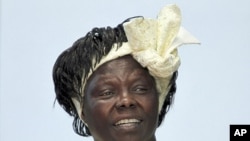Environmentalist and Nobel Prize Laureate Wangari Maathai died in Kenya’s capital late Sunday after a long battle with cancer.
Even in the midst of jubilation over winning the Nobel Peace Prize, environmentalist Wangari Maathai put her beloved Kenya first.
Shortly after receiving the honor in 2004, Maathai described to VOA what the victory meant for efforts to halt the massive deforestation in her country.
"This recognition in many way[s] endorses the campaign and brings it to the forefront so that leaders in this country can really realize that protecting the forest in this country is a matter of life and death," said Maathai.
Her life’s work has been to protect Kenya’s forests from politically-elite land grabbers. Maathai also spoke out for the rights of women at a time when most Kenyan women had little public presence beyond the homestead.
Maathai was a major figure in the pro-democracy struggles of the 1980s and 1990s. During her work, she was routinely harassed, beaten, tear-gassed and jailed.
But she also achieved a litany of firsts: the first woman in east and central Africa to earn a Ph.D; the first woman to chair a department at the University of Nairobi; the first woman in east and central Africa to be appointed as a professor; the first African woman and environmentalist to win the Nobel Peace Prize.
It is this spirit of perseverance that her colleague Edward Wageni most remembers. Wageni is deputy executive director of the Green Belt Movement, an environmental, civic, and women’s rights advocacy group Maathai founded in 1977.
“What we have lost is somebody who has the courage of conviction, a person who focuses on an issue, who doesn’t really look at the people who are going to be applauding her,” said Wageni.
Wangari Muta Maathai was born in central Kenya in 1940. At a time when it was rare for Kenyan girls to go to school, she graduated from Loreto Girls’ High School in 1959 and went on to complete a bachelor’s degree in biological sciences from Mount St. Scholastica (now Benedictine College) in Atchison, Kansas. She then earned a master’s degree at the University of Pittsburgh and a Ph.D at the University of Nairobi.
In the 1970s, Maathai became active in several environmental and humanitarian groups in Nairobi, consulting widely with women in rural areas. It was then that her passion for tree-planting took root. Ever since the creation of the Green Belt Movement, more than 47 million trees have been planted in Kenya.
Her work also involved education campaigns and linking environmental degradation with bad governance.
Following the pro-democracy struggles, Maathai was elected a member of parliament for Tetu in the 2002 elections and was appointed deputy minister for the environment. Two years later came the Nobel Peace Prize. Since then, Maathai has headed up several international efforts, including a United Nations’ campaign to plant one billion trees as part of a global effort to fight climate change.
But for all the accolades, awards, and honorary degrees she has received, colleagues and friends say Wangari Maathai had her two feet firmly planted in the ground.
“She was very, very much connected to the grassroots - a person who would be able to interact with the lowest person at the grassroots, but at the same time be able to speak at the highest levels," said Green Belt Movement colleague Edward Wageni. "So she was able to link the two - the international stage, and sitting down under a tree with women discussing issues at that level.”
Dr. Catherine Lore is a Ugandan doctor whose office is near the Green Belt Movement office in Nairobi. She says her neighbor was forthright, down-to-earth, and inspiring.
“I reflected back [on] the day that she received the Nobel Prize," she said. "I came running here with palm leaves in a long, tall pot, which I put in front of the door there. So today, I’m shedding tears of joy, because today we are celebrating the life of a truly actualized African woman.”
Wangari Maathai died in Nairobi September 25 while undergoing treatment for cancer. She was 71 years old. Maathai leaves behind three children and a grandchild.











